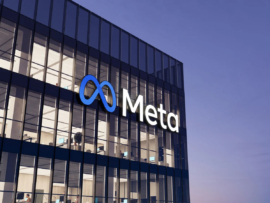
Meta has reportedly inked a $10 billion deal with Google for the use of its cloud services.
Data centre capacity is essential for all tech giants offering artificial intelligence products, but demand is rising faster than their ability to build the necessary infrastructure. This means that even competitors like Google and Meta are having to shake hands. Anonymous sources told The Information that Mark Zuckerberg’s company will be able to use Google Cloud’s servers, storage, networking, and related services for six years.
Meta’s constructing more data centres and expanding its AI product line
Meta, which currently runs 28 data centres globally, revealed last month that it is constructing two additional facilities in Ohio and Louisiana. These sites will deliver multiple gigawatts of computing power to advance its goal of achieving “superintelligence,” which is an AI system exceeding human performance.
The company has been funnelling huge amounts of money into this goal, poaching AI talent from Apple, Anthropic, Google DeepMind, and OpenAI for a dedicated superintelligence team with compensation packages reportedly in the billions. It expects its expenses this year to reach $118 billion.
The two new data centres are expected to come online in 2026 and 2030, but Meta wants to expand its Meta AI product line more quickly than that, so it is outsourcing computational power in the interim. In addition to Google, it has committed to using cloud services from Amazon and Microsoft for its AI workloads.
OpenAI also signed a similar deal with Google Cloud back in June, despite having relied on Microsoft’s Azure cloud services for several years. Sam Altman says that OpenAI is now “beyond the compute demand” of what any single hyperscaler can offer. The ChatGPT-maker is also pursuing plans to build its own data centres in the US capable of delivering 10 GW of capacity by 2029 through the Stargate project.
Google and Meta compete in various sectors
Meta and Google have been fiercely competing in online advertising for years. While Google dominates the internet’s advertising technology stack, Meta controls one of the largest closed ad ecosystems through its social platforms.
Google derives most of its revenue from search advertising, with sponsored links at the top of results pages, while Meta relies on targeted campaigns built on granular user data from Facebook, Instagram, and WhatsApp. In fact, Meta’s success in advertising is what has allowed it to spend so much on superintelligence.
Nowadays, Meta and Google also compete in the virtual reality sector with their respective smart glasses and VR operating systems. At the same time, Google Cloud is trying to catch up with Amazon Web Services and Microsoft Azure, the two largest cloud providers by market share, by landing new contracts. It has become a focus division for Google since antitrust actions threaten its advertising revenue, and has attracted 90% of generative AI “unicorn” startups.
On our sister site eWeek, read about how Meta AI allowed “romantic or sensual” chats with children until recent policy changes.





